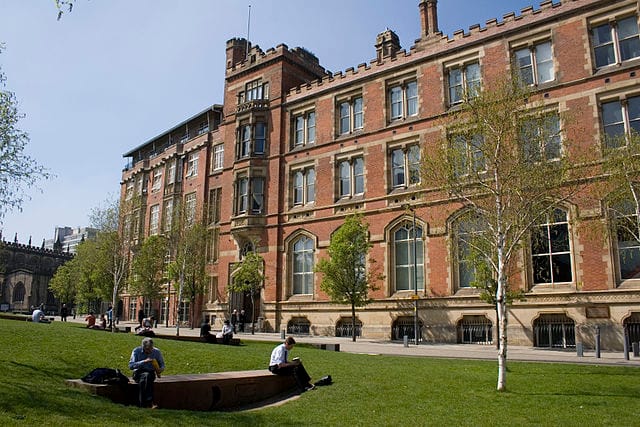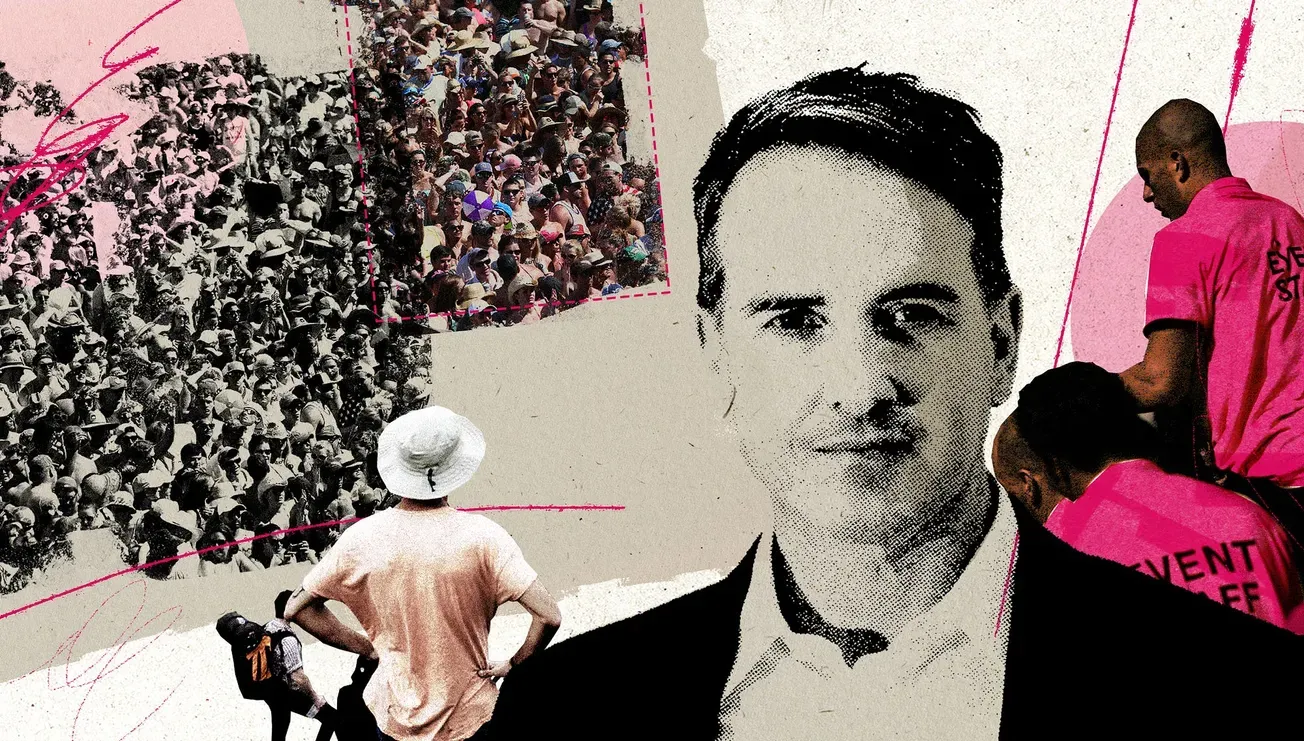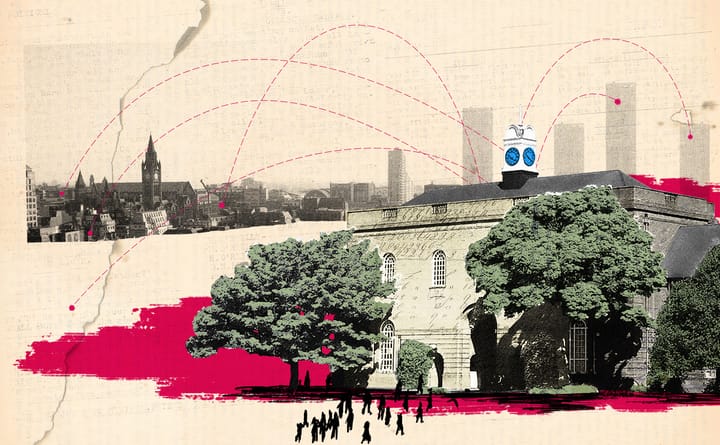If there’s one thing to be said about graduates of Manchester Grammar School, it’s that they know how to paint a picture (with words, though possibly also paint). I’ve never set foot in the school, but from the many interviews I’ve conducted with alumni I can tell you that, at least in the 1970s and ‘80s, it was an echoey and desolate building, where the floors and the edges were hard, where children carried briefcases, and parents kept large libraries at home and listened to Schubert. Many of the pupils apparently had a lot of fondness for the Lake District.
Over the past 510 years the school has amassed a near-masonic reputation, admired by many for its knack for funnelling Mancunians into Oxbridge, derided by others for students’ reputation for being, as one ex-pupil put it, “quite snobbish, and honestly, pricks, for lack of a better word.”
Regardless, the school has earned itself a reputation for producing the men who run Manchester: the bankers, the lawyers, the policy makers, the lords, the Sacha Lords. Mohammed Amin – a businessman and longtime Miller whose two sons went to MGS in the 90s, tells me that “MGS has been an integral part of Manchester since it was founded. It’s educated the children of the top people in Manchester, and even if they weren’t top people, by virtue of going there they became more successful.”
But is this still true? In modern Manchester, whose universities and companies recruit talent from around the world and which prides itself on being fantastically dynamic and meritocratic, does the school for so long associated with the Mancunian elite still have its hold over the city? Within minutes of posting a call out on The Mill’s Instagram account and our Monday briefing newsletter, I had a very long list of Old Mancunians who wanted to have their say.
 Manchester Grammar School’s new(ish) premises. Photo: mgs.org
Manchester Grammar School’s new(ish) premises. Photo: mgs.org
‘Horrible boys’
Manchester Grammar School (from here on, MGS) is not actually a grammar school at all, but a highly-selective fee-paying school for boys, the largest of its kind in the UK. Founded in 1515 “to educate the poor boys of Manchester in Godliness and good learning” (in their own words), it now costs £18,666 a year to attend the school — though MGS prides itself on giving out bursaries, with over 200 current recipients of full and partial grants.
Initially situated next to Manchester Cathedral, it now stands just off Birchfields Park in Fallowfield — a pale-red and tall-windowed building, designed on the cusp of the Great Depression. Every July, its arched doorway graduates around 200 new alumni into the city streets: Old Mancunians, as they are known.
One such graduate is Daniel Forster — at 21, he is among the very youngest of the Old Mancs. Forster has very positive (and very recent) memories of the school, recalling it fondly as a place where his “academic whimsy” was encouraged, and where his English teacher once suggested that he would one day take on the role of the “northern scholar” who “disrupts the southerners” at university.
The reality was not quite that. In his first week at Durham University, the head of the English society, who went to Manchester High School for Girls, called him out in front of the entire class for being an alumni of MGS, a school full of “horrible boys who used to pick on her at bus stops”. The school’s reputation had seemingly taken a turn. “I think it’s moved away from being this meritocratic northern school that punched above its weight for bringing northern pupils into southern universities, to being just another private school,” Forster says. “I don’t want to say the Eton of the North… members of staff used to hate that idea, whereas now it’s more embraced.”
Could this be true — that MGS has simply become a northern knock-off of posh rural private schools? A quick search of the school’s history reveals that it’s always had its critics, at least since 1802 when Thomas de Quincey absconded to become an opium addict. But it’s undeniable that the school has produced some of Manchester’s brightest and best. Among the most notable of the Old Mancs are former England cricket captain Mike Atherton (who now writes very good sports journalism for The Times), author Alan Garner, Academy Award winning actor Ben Kingsley, and one of the first Indian poets to write in English, Manmohan Ghose.
This story was published by The Mill: an award-winning email newsletter that sends you great stories, proper local journalism and peerless writing about life in Greater Manchester. 58,000 people have already joined our mailing list. Just hit that button below to join up for free.
The cabinet minister problem
Broadcaster and journalist Michael Crick is another example of MGS success. Attending the school between 1969 and 1976, he went on to study Philosophy, Politics, and Economics at Oxford, and later was a founding member of the Channel 4 News team and political editor on Newsnight for the BBC. He too has fond memories of the school, and to this day he contributes to the school paper, The Old Mancunian.
Still, he’s not convinced that MGS was ever a particularly influential force on the city. “I think it’s bollocks to say that Old Mancunians are dominating Manchester,” he tells me, reminding me that there are a number of areas that the city is renowned for in which MGS alumni make “bugger all impact” — music, for example, and property development. Crick lists the handful of his contemporaries who have gone on to pull strings of some kind in Manchester — Bishop of Manchester David Walkers, for example, “and he’s probably retiring in a year or two anyway,” councillors John Leech and Sam Wheeler, and Labour MP Jeff Smith.
Two Manchester councillors isn’t bad exactly but it doesn’t equate to the commanding heights of the city. Bev Craig, Manchester’s quiet but effective council leader who grew up on a council estate in Belfast, is about as far as you could wish from a brash Old Manc. Andy Burnham went to a state school in Newton-le-Willows and didn’t have deep connections in the Manchester Establishment when he arrived to become mayor — and the prospect of Old Manc Sacha Lord succeeding him has receded from view thanks to my colleague Jack’s unflattering reporting. “I’ve always felt that, actually, MGS underperforms in terms of what its Old Boys do,” Crick says. “It may have made them better educated, but they ended up being solicitors in Sale.”
Which brings us to something of a sore point for MGS alums that is mentioned to me by several of my interviewees: the school has never produced a single cabinet minister.
It turns out, however, that my sources have not done their homework: my research has turned up two MGS alums in the cabinet, including Norman Harold Lever, Baron Lever of Manchester, who served as Harold Wilson and James Callaghan’s cabinets, and Frederick Marquis, 1st Earl of Woolton, who served in Churchill’s war cabinet and his postwar cabinet. The men of MGS can officially stop fretting about their political inadequacy.
 Old Mancunian Sacha Lord. Illustration: Jake Greenhalgh.
Old Mancunian Sacha Lord. Illustration: Jake Greenhalgh.
Crick suggests a number of reasons why, in his view, MGS alumni don’t seem to have the influence across the city you might expect. Most students leave Manchester after graduating, he reminds me – in the 90s to London, nowadays to America – “and you’ve got to allow for the fact that women are increasingly influential,” he adds. Crick also mentions that, back in his day, a third of MGS graduates would get into either Oxford or Cambridge, in part due to the positive relationship between the establishments. “[Teachers] would say, ‘well, we’ve got this young boy, he didn’t do so well on his A-levels, but we assure you he’s really brilliant,’ and they’d let people in on that relationship,” he says. “Things are much more strict now.”
‘An awful lot of jealousy’
Two years after Crick graduated from MGS, Damian Lanigan arrived on the scene. Now a novelist and founder of Wetherglass publishing house, Lanigan was once a bursary student at MGS — two thirds of his fees were paid for by the school, and his mum funded the rest by selling her yellow Honda Civic.
Lanigan assures me that class didn’t play a big role in the school’s social dynamics, and that students came from a variety of backgrounds. Nevertheless he struggled at MGS due to its masculine environment, bullyish teachers, and “very, very prisony vibe”. He recalls a particular lesson in which his French teacher called a student to the front of the class, and aggressively rubbed his face with the whiteboard eraser for not being able to pronounce the sound ‘ou’.
“A sense of bullying was in the ether all the time,” he says. “If you were slightly unusual, or hapless, or god forbid gay, you were in for it.”
Like many of the Old Mancs I speak to, when I ask Lanigan about MGS’s influence on the city, he mentions that the school’s alumni rarely go on to be big in politics. Eton, he notes, is of comparable size, and has had 20 prime ministers — MGS has had none. He chalks this down in part to the school’s penchant for being “historically terrible at keeping in touch” with its alumni, but more importantly to the aspirations of the students themselves. Many MGS boys go on to roles in finance, commerce, law, media, he tells me. “The ambition is resolutely bourgeois,” he says. “You want to have a nice house and a garden and go skiing, you don’t want to be foreign secretary.”
 The boys at MGS. Photo: mgs.org
The boys at MGS. Photo: mgs.org
David Boyle is an Old Manc working in law. Now a barrister, he joined the school five years after Lanigan in 1983, studied at Cambridge, and returned to Manchester shortly after graduating “because [he] liked the soft water”. Boyle adores MGS, describes his years there with relish, and refers to all graduates fondly as ‘the lads’. “It was always a place of excellence,” he says. “It was always a place where, if you wanted to achieve your potential, it would give you the tools.”
Boyle claims that, since the ‘80s, it’s become very fashionable to deprecate the school, both from outside and within. “There’s an awful lot of jealousy from people that aren’t at MGS,” he says, while many alumni who “had the benefit” of the school still “for whatever reason resented it,” possibly because they didn’t want to accept that they were part of a conservative establishment.
“I don’t see a masonic network of backhanders and shady deals,” Boyle answers when I ask him if MGS is running the show in Manchester today. “There may have been one, but I wasn’t part of it,” (which, to be fair, is exactly what you might expect a member of a shadowy masonic network to say). He explains that the high number of Old Mancs in areas such as law and finance is self-explanatory: many of Manchester’s most gifted children go to MGS, and even if only a quarter of them stay in Manchester, you’re still left with what he describes as “an amorphous blob of quality individuals.”
Perhaps Guy Horne and David Searle are emblematic of the modern day MGS: two young men who met at the school and then made their fortune in Manchester’s property industry. Their company HSPG (the H stands for Horne, the S stands for Searle and the PG stands for Property Group) earns millions of pounds a year from the council for housing homeless people, and has been the subject of regular reporting by The Mill.
 David Searle and Guy Horne. Illustration: Jake Greenhalgh.
David Searle and Guy Horne. Illustration: Jake Greenhalgh.
Boyle’s two sons both attended MGS in the last decade, and he tells me that their experience is in many ways incomparable to his. “There’s far more of a United Nations approach to [the school] these days,” he says. He’s referring to something many alumni mention to me — that the demographic of the school has changed, from being predominantly White British with a significant percentage of Jewish students in the ‘70s and ‘80s, to having a large number of South Asian students now.
The aforementioned Mohammed Amin – of Pakistani heritage, who used to be chairman of the Conservative Muslim Forum – tells me that this simply comes down to “people from an immigrant background [being] much more aspirational at school.”
The lads of MGS
So what are things like these days? One boy who graduated last year, and would like to remain anonymous, tells me that nowadays “nothing good is associated with MGS.” Much like Lanigan who attended the school half a century before him, he describes a “laddish culture” fuelled by “extremely cruel” boys who inflict misogynistic and homophobic abuse on each other and the nearby girl’s schools. He even tells me that girls he met in Manchester have stopped speaking to him after finding out where he went to school.
Despite this, he in no way disparages the school itself. Both he and Forster (the aforementioned recent graduate) agree that they were never pushed towards Oxford or Cambridge, never even pushed to attend university at all — Forster even tells me that the infamous ‘Oxbridge Club’ at the school changed its name to simply ‘University Challenge’. There were still 32 offers from Oxford and Cambridge to MGS students this year, ranking it 10th in the country, and still in the top spot for schools in the north.
However, this is a significant step down from the 70s and 80s, when Crick and Boyle tell me that a third of the students – around 70 each year – would go to Oxbridge. Instead of being pushed to attend these universities, the younger boys tell me that their genuine talents and ambitions were taken on board, and nurtured. “They were like, ‘give it a go’,” said our anonymous Old Manc. “‘If it doesn’t work, it doesn’t.’” This can-do attitude is typical of GMS alumni — Guy Horne of HSPG, for example, went on to record a number of commercially unsuccessful pop songs in which “his voice radiates with a comforting familiarity,” if critics are to be believed.
 Guy Horne returns with soulful indie-pop gem. Photo: earmilk.com
Guy Horne returns with soulful indie-pop gem. Photo: earmilk.com
This isn’t to say that MGS has rid itself of archaic eccentricity. Forster tells me that even now the school employs a Proctor, “this short bloke with a waistcoat who would go around shouting ‘Where are your strides, boy?’” — something Forster describes as a bit weird. “You know it’s a bit ridiculous, but you go along with it because it’s part of the culture,” he says. “It’s part of what the school has always been like.”
As for the influence of MGS today, when I spoke to David Boyle about this matter, he told me that “it’s difficult, when you’re inside a bubble, to appreciate how far that bubble extends.”
From the outside, Manchester Grammar School has produced Oscar winners, Nobel Laureates, concert organists, cryptographers, batsmen, theatre directors, and occasional Mock the Week panellists. And given the (admittedly, weakly sourced) allegations of bullying at bus stops, it might be for the best that they stay out of the cabinet.
If you enjoyed this article and you’re not yet a Miller, here’s how to change that.
The Mill produces great reporting and peerless writing about everything from education to politics, crime to conservation in Greater Manchester.
The Millers, our readers, get all our stories direct to their email inbox, and are part of a brilliant community that sends us story ideas and debates the issues of the day in the comments. Just hit that button below to join up for free.
Want to read about actual grammar schools? Try Ophira’s recent two-part series on Trafford’s highly sought after grammars. The first is on the bizarre fight for parents to get their children into the prestigious schools, while Part Two discusses whether Trafford should keep its grammar schools at all.

